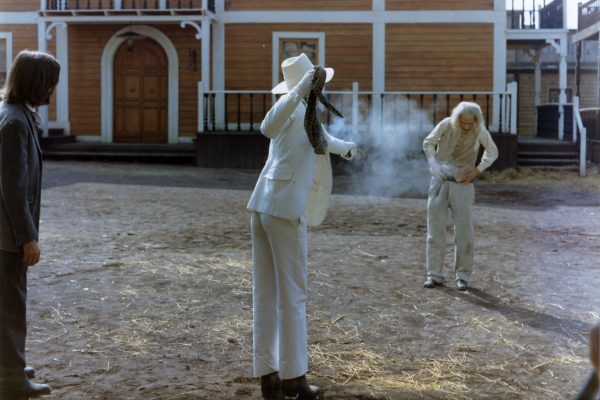Available on Blu-ray from Mon 6 May 2019
This Spaghetti Western stars genre regular Lee Van Cleef as former sheriff Clayton, who helps fugitive Philip Wermeer (Alberto Dentice) evade bounty hunters targeting him due to his alleged murder of the Patriarch, a man who effectively governed the neighbouring town of Saxon City. Wermeer also seeks to avenge the murder of his father, who Wermeer believes to have been killed by one of the Patriarch’s men. However, when the two enter Saxon City and end up confronting the Patriarch’s sons, Clayton reveals that he plays a more important role in the whole situation.
Van Cleef effectively portrays Clayton’s cool, calm demeanour that conceals his expertise in gun-fighting as he dispatches the bounty hunters and Saxon men on their tail. This also reveals the character’s sense of honour as he maintains his belief of Wermeer’s innocence regarding the Saxon Patriarch’s murder. This role isn’t a big stretch for Van Cleef, as he is more or less playing the same character type seen in his other Spaghetti Westerns, most notably Sergio Leone’s For a Few Dollars More and The Good, The Bad and The Ugly, however, he does such an effortless and subtly charismatic job with the role that it’s hard to see this as a negative point.
Van Cleef shares an effective chemistry with Dentice, with both actors convincingly portraying their initial animosity during an early scene showing them playing cards, which becomes increasingly tense as it progresses. Dentice also skilfully portrays both Wermeer’s sympathetic and threatening aspects, although a few of his one-liners do come across as unintentionally funny, possibly due to poor translation of the Italian script into English.
Director Santi skillfully depicts the film’s action sequences, with the first gunfight involving Wermeer making good use of acrobatic stunt work to add a degree of stylistic variance to the potentially-repetitive nature of portraying shootouts. The climactic duel between Clayton and the Saxon brothers also makes effective use of rapid editing and quick, fluid choreography to make the sequence and final outcome appear distinctive and representative of the character’s gun-fighting skills.
However, the film does suffer from the problems commonly associated with the Spaghetti Western genre, namely comical dubbing and dialogue, particularly from the ‘old-timer’ characters. The plot and characterisations are also a little cliched, with the same archetypes and situations seen in previous Spaghetti Westerns being reused, albeit to good effect. In addition, the score by Sergio Bardotti and Luis Enriquez Bacalov, memorably repurposed in Tarantino’s Kill Bill: Vol. 1, is haunting but suffers from overuse, particularly during the film’s climax.
Despite these issues, The Grand Duel is a solid entry in the Spaghetti Western genre that features Van Cleef doing what he does best. Why he never achieved greater success in Hollywood is a question that needs to be asked more often.
